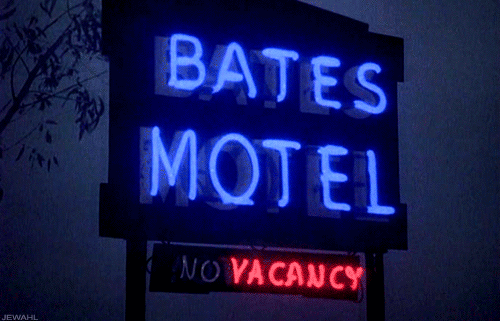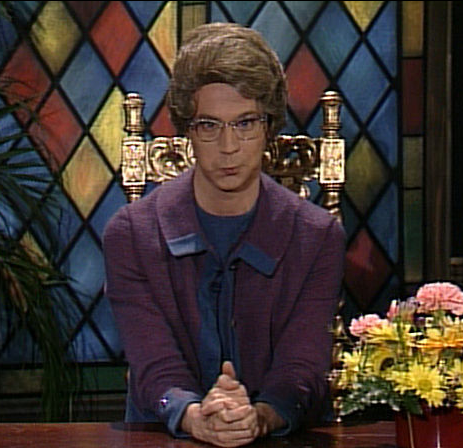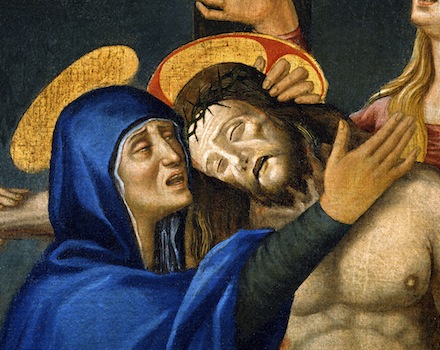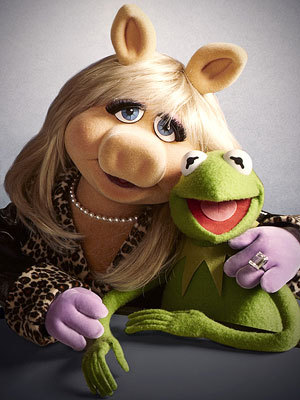
In an age where true fatherhood seems to have lost all meaning, it is all the more important to consider its impact on society today. How do you explain the significance of fatherhood? How do you put into words just what a father's love means to the soul of a child? All of this seems lost on a generation that might be able to comprehend the virtue and beauty of maternity, but cannot see much value in manhood. Is fatherhood obsolete? Is it preferable for Heather to have two Mommies because men/daddies are just useless buffoons? Simply judging from the TV shows and movies out there, one would certainly get the impression that fathers should be seen and not heard. Either they are idiots, doormats, or just some vaguely benevolent force, trained to remain painfully docile. This is not to say that fathers should be a bunch of patriarchal blowhards, but it would be nice if we were to see every once in a while a bit of paternal authority represented in a more positive light. In spite of this emasculating tendency, it is interesting to note that popular music provides a far less facile assessment of what a father means to our lives. Thus, during this octave of Father's Day, let us consider the true meaning of fatherhood, and let us do so through the vehicle of popular music.
Another Brick in the Wall (Part I) - Pink Floyd
"Daddy's flown across the ocean/ Leaving just a memory/ The snapshot in the family album/ Daddy, what else did you leave for me/ Daddy what you leave behind for me? All in all it was all just bricks in wall..." This semi-autobiographical album by the band Pink Floyd explores all of the things which can ultimately lead a man to build a wall around himself. "Pink" (the main character in the story) loses his father during the war in childhood, and as a result has a profound identity crisis, especially as he grows into manhood. The more the father is remote (whether physically or emotionally), the more the son will, in all likelihood, follow suit. A child who lacks a consistent male role model in his youth, more often than not finds himself struggling to figure out who he is as a man. This lack of a "sense of self" quite often manifests itself in the form of substance abuse, mistreatment of women, bouts of anger, and an overall inability to articulate one's feelings of frustration and confusion. Ultimately every son derives his sense of meaning as a man from his father, and if there is no father, there is a tendency on the part of the son to feel impotent and unmanned. In short, the absence of the father begets the absence of the son.
The Leader of the Band - Dan Fogelberg
Among all of the the songs on this list, more than a few touch on the matter of how a son inevitably reflects his father. There is something more than a little Biblical about the notion that the son is in the father and the father is in the son. As it relates to this song by the late Dan Fogelberg, we can see how this intermingling of flesh and blood expresses itself in a whole host of ways; "... his blood runs through my instrument and his song is in my soul. My life has been a poor attempt to imitate the man. I'm just a living legacy to the leader of the band." There is something bittersweet about Fogelberg's description of his father (pictured above), for it sounds like he, who is a musician in his own right, is suffering underneath the heavy burden of his father's legacy. Yet if this is the only thing you get out of the song, then you have missed something most profound about the father-son relationship. To someone who knows nothing about this bond, Fogelberg's sentiments must seem to be little more than a tragic lament, but to one who understands the way a son looks at (or up to) his father, it is much more than that. To believe that your father is Superman is no more of an obstacle to a child's love than a bow is to a violin. They are complete only in tandem. Yes, there is an element of sadness in the song, but it is not the defining mood. The defining mood is one of gratitude. If there is sorrow in the song at all, it comes from the fact that he has not expressed this sentiment sooner. "I thank you for the music, and your stories of the road. I thank you for the freedom, when it came my time to go. I thank you for the kindness, and the times when you got tough. And papa I don't think I said 'I love you' near enough..." Gratitude for music, gratitude for stories, gratitude for kindness, and even gratitude for toughness and discipline. Yes, a young boy wants his father to call him out when he is out of control in spite of what some may believe. Spare the rod and not only will you "spoil the child", but the child will later resent you for failing to prepare him for life. This is not to say that the child will thank you immediately, or even that he will thank you in this life, but a true father is willing to forego this sort of immediate gratification in order that his son or daughter may grow in virtue and discipline. The fact that his father is a "quiet man" (or so the song says) should not be regarded as a bad thing either. Indeed, a man does not have to be constantly "sharing his feelings" in order for his son to understand that he loves him dearly. As a matter of fact, in some ways a father communicates his love more through his quiet durability than through any needless proliferation of words.
Daughters - John Mayer

There are few people on the face of the earth that I would want near my daughter less than John Mayer (he would be a close second to a rapist, though there's much in common between the two). However, the muse is sometimes an incredibly indiscriminate with these things, and even when a musician himself does not live the virtues he sings about, he may still on occasion provide good insight on a subject. Such is the case with this John Mayer song; "Fathers be good to your daughters, daughters will love like you do... Oh you see that skin, it's the same she's been standing in..." Scripture says that the sins of the father will be visited upon the children unto the third and fourth generation, but who knew how practical this advice would be? If one possesses any kind of awareness at all about the development of young girls, one knows that they ultimately derive their sense of love and self-worth from their father. If they do not receive it from him, then they will generally chase love in all of those places where they are incapable of finding it... thus perpetuating a cycle. "Boys you can break. You'll find out how much they can take. Boys will be strong. And boys soldier on. But boys would be gone without the warmth of a woman's, good, good heart... on behalf of every man looking out for every girl (really, John???). You are the god and the weight of her world." One wonders where a snake like this would get such wisdom. Nevertheless, his point is well taken. Women are the great humanizers of the human race, but without a father loving his daughter as he ought, that warmth will quickly dwindle away (think feminism).
New Life - Blind Melon
This song by the late Shannon Hoon is in many ways a kind of simple prayer. It is about the announcement of the birth of his daughter, and an expression of hope that this "annunciation" will mean "new life" for him; "'Cause now she's telling me she'll have my baby/ And a faithful father I am to be/ When I'm looking into the eyes of our own baby/ Will it bring new life into me?" On the positive side of things, this is obviously a beautiful sentiment. Many a man who was derelict prior to becoming a father finds new strength in this beautiful vocation. Emotions arise that were long dormant. And when you're "looking into the eyes of your own baby" it breaks your heart even to consider the possibility that something so pure might be sullied by the perversity of a fallen world; "Should I teach one not to know how/ How to live in the world we live in now?" Tragically, Mr. Hoon was not able to fulfill his dreams of fatherhood (he died of an overdose). Not to over-speculate, but perhaps there was something missing in his overall disposition towards this new life. On the one hand, he most certainly had a sense of awe and wonder in the face of this spectacular gift. Not only did his little girl Nico represent "new life" for him in the physical sense, but equally important is the fact that she represents it in the divine sense as well. She is the image of his redemption. Still, what is fundamentally lacking from his general disposition, at least from the perspective of this song, is a real sense of resolve to change. He wants the baby to "bring new life into him", when in truth he is the one that has to be willing to change
his life in order to be the father that he knows he should be. In the end, whether it's a baby, falling in love, or some other beautiful but terrifying responsibility, you cannot sit idly by and hope that those initial feelings will provide enough impetus (on their own) to make you change. Part of being a man is to recognize what has been entrusted to you, and then to change accordingly to protect that interest. You cannot simply wait around hoping that the feeling of love will be so powerful that you can do naught else. Love may begin as feeling, but it must end with an act of the will.
I'm Taking You Home - Don Henley
Back in the 1970s Eagles front man, Don Henley, was certainly not the worst of his breed, but he also was not someone who avoided the "fast lane" either. With songs like
Hotel California and
Pretty Maids All in a Row, he and his other band mates revealed a little bit of what life was like for them at the time. And though there is a clear hint of ambivalence in these songs about the whole rock n' roll lifestyle in general, there was certainly not enough ambivalence to change their behavior. During this time, it is purported that Henley and Stevie Nicks had a semi-serious relationship which ultimately led to a pregnancy and an abortion. Apparently, it was quite common for Henley to romance a lady with flowers, dinners, and an occasional surprise trip to Paris on his personal jet. "Love 'em and Lear 'em" was the amusing way that Henley's band mates described his behavior. At any rate, in the above song we see a profoundly different attitude on the part of Henley. In many ways, it represents the conversion and transformation that the late Shannon Hoon longed for but never achieved. What it also points to is the difference between self-love and one that is sacrificial. It is not that Henley was unhappy in his former life, but when compared to real love, one realizes just how shallow and empty the former was; "I had a good life before you came. I had my friends and my freedom and I had my name. Still there was sorrow and emptiness, 'till you made glad. Oh in this love I found strength I never knew I had. And this love is like nothing I have ever known. Take my hand love, I'm taking you home." The difference between the two versions of Henley is the difference between mediocrity and manhood, between the Hotel California and Heaven. To those who are properly disposed to receive it, fatherhood is the fulfillment of manhood. To those who are not, it is merely the unwelcome end to adolescence.
Father of Mine - Ever-clear
This late 1990s song by the band Everclear is about a father who is apparently there at the beginning for his family, but then soon after abandons them. What is most striking and unique about this story is that it describes in detail the direct emotional and psychological toll that it takes on a child; "Father of mine. Tell me where have you been/ You know I just closed my eyes/ My whole world disappeared... I remember blue skies/Walking the block/I loved it when you held me high/I loved to hear you talk/ You would take me to the movie take me to the beach/ You would take me to a place inside that is so hard to reach." Not only do these words describe what the father meant to the son (i.e. the world), but it also describes in a very telling way what the sound of a father's voice means to his son, not to mention what it feels like to be held in your father's arms. We assume that the boy's mother was there for him all along, but whatever good she did (which I assume was much), could not substitute for the loss of his father. As a consequence of this abandonment, the lead singer (about whom the song is written) vows never to do the same to his own child, but nevertheless admits that not having a father in his life has left him permanently scarred; "I will never be safe/ I will never be sane/ I will always be weird inside/ I always be lame." It is impossible to report exactly what a father means to his son in the end, but in the context of this song we can at least say that to the lead singer of the band Everclear, a father's presence (as well as the lack thereof) means the "whole world."
My Little Girl - Tim McGraw
Fatherhood is not just about what fathers mean to their children, but what children mean to their fathers. Men do not possess the same umbilical attachment to their children as do mothers, but their fate is no less tied to their children. A few years back, I remember there was a controversy over a photo shoot that involved the bare back of a then fifteen year old Miley Cyrus. When pressed on the issue, her father, Billy Ray Cyrus, responded that there was nothing to be alarmed about, especially since he (Achy Breaky Dad) was there for the whole photo shoot in order to make sure the pictures were not
too exploitative. With guardians like that, who needs photographers to exploit you? In my view there are few things a father could do that are more reprehensible than this. The most natural instinct in the world for a father to want is to protect his daughter from the ogling eyes of a creep. However, in this situation, what is most stunning is the fact that not only is Mr. Cyrus giving innumerable creeps a front row seat to leer at his daughter, he is actually accepting admission for it. It is true that a father may go overboard with this at times, telling everyone, including his daughter, that she may not date until she is thirty, but can anyone in all honesty argue that this is not preferable to the former? To his credit, Mr. Cyrus admitted some years later that his laxity was instrumental in leading his daughter astray, but sadly this does not change, at least for now, the damage that has already been done. The above titled song is the antidote to the aforementioned tragedy. A father should put the fear of God into any man who would dare even dream of taking his daughter out. He must make it abundantly clear to this boy/man that he (the father) cares far less about what the authorities think than he does about protecting his daughter. No one is worthy of his daughter, but if the boy proves himself worthy
enough, the father may nevertheless recant on his demands for perfection; "Some day some boy will come along and ask me for your hand. But I won't say 'yes' to him unless I know he's the half that makes you whole, he has a poet's soul, and the heart of a 'man's man.' I know he'll say that he's in love, but between you and me, he won't be good enough." A true father is above all things a guardian of his most priceless treasure, and if he is not that, then he is not worthy of the title.
The Shadowlands - Ryan Adams

As suggested in the previous example, a father is fundamentally a protector, but one needs not necessarily be a father to be a guardian. Sometimes even while the father fails in this respect, another man will come along and provide what he has not. So many fathers are lost out there in the shadowlands, and as a consequence many children feel themselves orphaned. In the midst of such tragedy, there are those who thankfully become a kind of St. Joseph to the abandoned ones; "God please send the rain. Yeah, bring it soon. Let it flood right through the houses, into Judy's room. With a father on amphetamines, the mother hides her pearls. Reach out into the darkness and find my little girl." Even while her real father is as a ghost of who he should be, there is another man who in essence adopts her and gives his "little girl" the care that she undoubtedly seeks. Within this kind of disinterested love, there is some of the mystery of the Catholic priesthood, a fatherhood which seeks only the highest good for the other, without demanding anything in return; "Please lead her to the mountain/ that you (God) fashioned out of sand..." Both the father and the daughter are a prisoner in these "shadowlands", and thus all the subject can do is to pray that mercy will fall like rain and wash them clean. "Cause she's angry like a salesman/ that just couldn't make a sale/ Threw the wedding rings in the sewer/ and damned them all to hell." Needless to say, this cycle of abuse and despair can only be broken by a miracle of grace- a divine intervention into the gloomiest regions of this ghost world.
Coward of the County - Kenny Rogers
A son doesn't need his father to be a perfect man- what he needs is for his father to care enough about him to tell him how to be one. It is true to say that a father's actions are more important than his words, but it is also true that a few words of wisdom at an opportune time can stick with a child for the rest of his life. Such is the message of the song
Coward of the County by Kenny Rogers. It is a song about a father who goes to prison and dies before he can be released. Yet before he dies, he makes one final request of his son; "Promise me son not to do things I've done/ walk away from trouble if you can/ It don't mean you're weak if you turn the other cheek/ I hope you're old enough to understand/ Son, you don't have to fight to be a man." Perhaps it is a bit of a stretch to say that there are parallels here between Jesus' words to his apostles; "do this in memory of me," and those of the father's in this song; nevertheless, it does show you the power of a request that is made when one is on the brink of death. What this song also demonstrates is the desire in the heart of every young boy to idealize his father and subsequently "do whatever he tells you." All the same, the father in this story is clearly not ideal in the traditional sense, yet once again, a son doesn't need his father to be flawless, what he needs is for his father to
teach him right from wrong. In spite of the fact that "Tommy" had so little time with his dad, his father still clearly had a great influence over him. There are two reasons for this. First, the father was humble enough to recognize that what he had done in his past was wrong (not always a common trait in men), and secondly, he loved his son enough to give him a commandment before he died (viz. turn the other cheek, unlike me). For most of the song Tommy keeps his father's command- even doing so at the expense of his own reputation (he was called "yellow"). Indeed, only reluctantly does Tommy choose to break his father's command at the end of the song; "I promised you dad not to do things you've done. I walk away from trouble when I can. Now please don't think I'm weak, I didn't turn the other cheek. And papa I still hope you understand. Sometimes you've got fight when you're a man". This faithful son was willing to be called the "coward of the county" rather than disobey his father. The only thing that could get him to "break" his father's command was an act of chivalry whereby he sought to defend the honor of his girlfriend Becky. At this moment Tommy makes the ever important distinction between the letter of the law and the spirit.
I'm Watching You - Rodney Atkins
This sweet little country ballad has a very simple but potent message. The point here is not simply that our children reflect us in our behavior, but that they are, in spite of what we may think, taking note of everything we say and do (who needs NSA when you have kids?). In the first part of the song, the son hears his father using profanity, and so happily imitates him. Saddened by these earlier events, the father later gets on his knees and prays to God to save him from his "stupid self." That night as he is about to tuck his little boy into bed, his son gets on his knees and prays to God in such a way that it impresses the father. When the father asks his son where he learned to pray like that, the son responds; "I've been watching you... I'm your buckaroo. I want to be like you... We like fixin' things and holdin' mama's hand. We're just alike. Hey, ain't we dad? I want to do everything you do, so I've been watchin' you". It
ain't Shakespeare, but it does demonstrate the grave responsibility each father has to model the right things to his children. In these particular lines, we see not only how the father's negative behavior affects the son, but also the affect of the positive behavior as well. Indeed, just by watching the way the father interacts with his mother, the boy learns how to show respect to women. And just by watching his father pray, he learns how to revere the Father in heaven (not to mention his own). How many spiritually absent fathers are there out there today? How few men actually teach their children how to pray? How many times have I seen a mother alone in the pews with her children in tow- like a bookend without its companion piece? How likely are the male children to continue the practice of their faith without a father who believes as well? Hint: not likely.
Fast Car - Tracy Chapman
This haunting ballad by Tracy Chapman chronicles the struggles of a young lady who's dreams are brought to a screeching halt because of the alcoholism of her father; "See my old man's got a problem. Live with the bottle that's the way it is. He says his body's too old for working; body's too young to look like his. So mama went off and left him. She wanted more from life than he could give. I said somebody's got to take care of him. So I quit school that's what I did." The daughter is willing to work "down at the convenience store" if only to take care of her alcoholic father. There's something beautiful and tragic about the love of a child who is willing to honor her father, even when her father is unworthy of such honor, and even while her mother is unwilling to do it. This is not to say that a child should always stand by her father no matter what, but only that the loyalty of a child sometimes surpasses any and all reason. God knows we need people in this world to love us beyond all reason.
Tiny Broken Heart - Allison Krauss and Union Station

This blue-grass standard was recorded by Allison Kraus and Union Station for a live album in 2002. The song is about a seven year old boy who has big plans to raise enough money to prevent his childhood sweetheart from moving away; "I know dad you don't understand, how a heart so young could conceive a plan. I'm only seven now but it's just like you said, daddy someday I'll be a man... Let us buy the farm so they can stay. And give them all the toys that my dear Santa gave. And give them all the money in my little piggy bank; money that my darlin' helped me save." The beauty of this song is its simplicity. Some father-son experiences are not meant to be headlines, or even tragedies, but simply one of those "slice of life" moments in some way relatable to all. The father in this story must be in absolute awe over the depth of his son's desire to keep his female buddy from moving away. Back in the 1990s it was fashionable to talk about "getting in touch with your inner child", but this story is the exact reverse: a story about the man inside the child. It is telling I think that in these times we try to extend adolescence as long as possible by speaking of our "inner child", whereas in prior generations it was more about a father teaching his sons how to be a man. Anyhow, who can't relate to the sweet dreams of a child who's ideas are as large as any man's, but who's awareness of life's larger complications are about as small as his "tiny piggy bank".
Oh Father - Madonna
Oh Father is a song about a daughter who blames herself for her father's abuse. As mentioned before, children will often blame themselves for things that they couldn't possibly have been guilty for (like their parents' divorce), but because they share the same flesh and blood with their parents, there is a mysterious sense of culpability on the child's part. Fortunately, some grow out of this false and debilitating sense of guilt and culpability; "It's funny that way, you can get used to the tears and the pain. What a child will believe... It seems like yesterday, I sat down next to your boots and I prayed for your anger to end, Oh father I have sinned. You can't hurt me now. I got away from you, I never thought I would. You can't make me cry, you once had the power, I never felt so good about myself." Perhaps we do carry their sins about in our flesh like Christ carried our sins- and unless we put them to bed, they do become a part of us. But whatever the situation, realizing that you are not guilty of the sins of your father is not the highest and most important form of wisdom (though it might be the beginning). Indeed, there is another step in the healing process. One of the greatest signs of emotional maturity is the simple discovery that we are not the source of every good thing our lives, nor is someone else the source of every bad thing. This is what we call perspective and it is given only to those who are willing, not only to forgive the sins of others, but to realize that we too have quite a few of our own to be forgiven. When you see this, you begin to realize for the first time just how much time you spent
blaming, and how little time you spent
thanking. Being sanctimonious and superior with respect to your parents is not only obnoxious, but a lie. You are not the first or last victim of ill-treatment. In fact my guess is, you too may fail in many of the same ways that your parents did. You may even fail in ways that they did not. The best way to avoid some of the pitfalls of parenting, is by realizing that you are just as capable of making the same mistakes; "Oh father, you never wanted to live that way, you never wanted to hurt me, why am I running away? Maybe someday I will look back and be able to say; you didn't mean to be cruel, somebody hurt you too.." There, but for the grace of God go I.
Cats in the Cradle - Harry Chapin Carpenter
More than anything else, this song is a lesson and warning for future fathers. Harry Chapin Carpenter once commented (in reference to the song) that many of the most important lessons we learn in life are often after the fact. This may often be the case, but in this instance it need not be. I would argue that just as science fiction screams at us to avoid a future that resembles
1984, so also this song screams at us like a warning from Marley's ghost. Fathers need to be reminded just how quickly the time slips away from them. If you are constantly waiting around for the right time to do what you should have been doing all along, that time will never come. Wake up! Now is the time to throw ball with your son, for if you wait until tomorrow, tomorrow will turn into the next day, and into the next, on and on until you realize that it is too late for you; "And the Cat's in the Cradle and the silver spoon, Little Boy Blue, and the Man in the Moon..." These words, according to Harry Chapin, were meant to express the speed and transience with which childhood passes. Obviously this is yet another example of a song that reminds us that our sons will be (and want to be), "a lot like you, dad"; but just as important is the troubling admonition, which essentially states; "It's too late for me, but you still have a chance..." Tragically, there are far too many dads who hear this warning, but nevertheless share the same fate as the subject of the song.
All This Time - Sting
After the death of his father, Sting dedicated his next album to his memory. Several of the songs on this album, titled
The Soul Cages, chronicle the manner in which Sting mourned his passing. Based on the content of these songs, it is clear that Sting is very conflicted about his father, and even after his death he seems to be more than a little ambivalent about their relationship; "Why should I cry for you? Why would you want me to? What would it mean to say, I loved you in my fashion?" There are some aspects of a father-son relationship that will never be worked out in this life. Indeed, there are some emotional chasms so deep and wide that only God can bridge them. In some sense the problem is not that there is too much space between fathers and a sons, but that there is too little. When we are around our fathers, more often than not, we may wish that were in fact more emotionally distant than we are. The truth is we feel stifled and overwhelmed by the tangle of emotions which are impossible to adequately distinguish; "And if I built this fortress around your heart. Encircled you in trenches and barbed wire. Let me build a bridge for I cannot fill the chasm. Let me set the battlements on fire." The frustration and complexity of the struggle that Sting describes is so epic, that he can only describe them in the most cosmic of terms. Who's right? Who's wrong? God knows. "Then I went off to fight some battle that I invented inside my head. Away so long for years and years. You probably thought or even wished that I was dead..." And even after his father's death, this battle of epic proportions is still going on in his head; "Two priests came 'round our house tonight, one young, one old, to offer prayers for the dying to serve the final rite. One to learn one to teach, which way the cold wind blows. Fussing and flapping in priestly black lack the murder of crows... All this time the river flowed, endlessly, like a silent tear. All this time the river flowed. Father, if Jesus exists then how come he never lived here..."
Father and Son - Cat Stevens
With all this discussion about how the father reflects the son and vice versa, I will conclude this post with how they are also different. They are a communion of flesh, which makes them a biological and psychological reflection of one another, but they are nevertheless unique persons as well. It is understandable that a child would seek to imitate his father, but a son has his own vocation to consider as well. Yes, he wants to please his father, but sometimes the father's pleasure is not his own. This is perhaps the most difficult thing for any loving (and sometimes unloving) parent to accept. For in many ways the parent sees the child as an extension of their own hopes and dreams. At worst, the parent sees the child as little more than a projection of their thoughts- like an old nostalgic movie projected onto a screen. Similarly troublesome are those parents that see their children as a separate, if manipulatable, appendage protruding from their own body. It is a little like a three legged race, one in which the child is forced to finish at the parents behest. In any case, most parents (including Mary) have some degree of "separation anxiety." After all, that indelible belly button marks us as connected even after the line is cut. It is only natural and healthy therefore to desire great things for your child. Likewise, it is understandable to fear that you are losing control over their fate when they gain their freedom. Nevertheless, this is the transition that must take place in every case. In order for a child to remain in union with his parents, his parents must permit him to find out who he is in himself. A true union must involve free persons. You cannot at once emotionally enslave someone and then demand that they love you of the their own volition. You must impart to them every good thing that you have, and when it's time- leave them to it; all the while keeping in mind that the conclusions they reach for their life are not merely meant to mimic your own; " (the father) Find a girl, settle down. If you want you can marry. Look me, I am old, but I'm happy. (the son) How can I try to explain, when I do he turns away again. It's always been the same old story. From the moment I could talk I was ordered to listen. Now there's a way, and I know that I have to go away. I know, I have to go." No doubt there is an obvious tension between the wisdom and deliberateness of a father who says; "Take your time, think a lot. Think of all the things you got. For you will still be here tomorrow, but your dreams may not"; and a son who is young and wants to leave his mark on the world. But whether or not a father and son strike the right balance between practicality and liberality- between oneness and uniqueness- there is something of the eternal to be witnessed here. This back and forth between father and son is not just some challenging- though otherwise meaningless hoop to jump through in life. It is an expression of the very tension that exists within the Holy Trinity- and which is further expressed when Jesus (the Son) consoles the apostles about the nature of his imminent departure; "But very truly I tell you, it is good for you that I am going away. Unless I go away, the Comforter (i.e. the Spirit of Communion) will not come to you; but if I go, I will send him to you." In the same way, if the son does not depart from the father's house and properly distinguish himself, there cannot be an authentic bond of equal, yet unique, persons. Hence, it is the duty of the father to send the son out (and for the son to go), for it is only in this outward procession that the son can ultimately return to the father and embrace him freely. Indeed, without this subsequent procession, the bond of love that is shared between the two of them is utterly meaningless.
The point of this list is not only to demonstrate the importance of a father's love through a series of good examples, but also through a series of bad ones. The virtue and necessity of fatherhood is proved by the good it accomplishes when it functions as it should, and by the evil it accomplishes when it fails at its duty. If it were unimportant, the effects would be negligible on both fronts. Just as the absence of faith in God creates the conditions for inhumanity, so also the loss of faith in fathers can inspire the same in their children (see the "Jeremy" video). Some will argue in essence that because men/fathers have failed so miserably that fatherhood in the old sense has become obsolete. Children, they argue, will adapt to whatever environment into which they are placed, and that as long as there is love in those places, it matters very little who's giving the love. And indeed this sounds very convincing on the surface, until you realize that this formula only works if you are declaring the surrender of the family. The problem with this solution is not that love as a general concept is unimportant as long as you have a family, but that love of its nature is not sexless and interchangeable. Life is not unisex. Rather, it is overrun (or it would not be overrun at all) with the glory of the two sexes. "Two mommies" can love their baby boy, but how can they even begin to model manhood for him. And two daddies can show up to their daughter's dance recital, but God knows that no man can even begin to replicate the true feminine genius? One does not fix the problem of derelict parenting by inventing an artificial version of it, one fixes it by fixing it! If, for whatever reason, one prefers the destruction of the human family as constituted by nature, then at least be honest enough to admit as much, but do not pretend as if there were no other alternatives. The truth is we are marked indelibly by the distinction of the sexes. There is no "us" without them. And no matter how far we drift from the significance of this truth, that umbilical cord of being will always yank us right back to that objective truth that is inscribed into our bellies. What better evidence have we for this reality, than the beautiful- though sometimes tragic affection that we feel- not for some nameless-sexless parent- but at the mere mention of a word that marks our being from all of eternity: Daddy.
For my Dad: Father's Day 2013





































